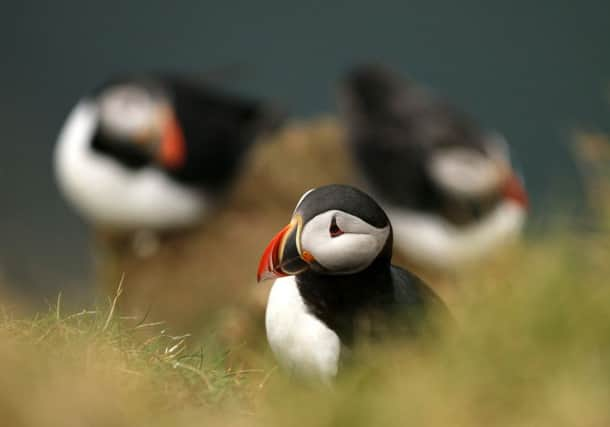Bertie Armstrong: Fish deeper to solve puffin problem


It’s a pity there is a rather blinkered approach to the protection of our seas that leads some to immediately point the finger of blame at the fishing industry whenever there is some kind of environmental issue.
Only recently there was the sad news that Atlantic puffins are in decline, and while the majority of media articles on the story were well balanced and accurate, inevitably there were a few that cited overfishing as one of the reasons.
Advertisement
Hide AdAdvertisement
Hide AdThis presumably refers to sandeels, which are an important food for puffins. Sandeel fishing certainly does occur in some parts of the puffin’s wide north Atlantic range (where it is closely managed), but there is no longer any dedicated sandeel fishery in Scottish waters. There has been virtually no commercial sandeel fishery in the Shetland area in the last 30 years, except for a limited allocation in 1997 and 1998. In the last ten years, the East of Scotland sandeel fishery has been restricted to scientific monitoring purposes.
I think all this highlights the need to think a bit more outside the box when it comes to determining the key factors behind marine changes. Of course, climate change and natural oceanographical fluxes are always likely drivers. But here is a question. Could it be that increasing stocks of predator fish species such as haddock, cod and mackerel, which all feed upon sandeels, are playing a role in the decline of seabirds such as puffins by providing competition for an important food source?
Indeed, the respected scientific body, the International Council for the Exploration of the Sea, has already stated that natural mortality, such as predation between species, is now the dominant force in driving fish stock dynamics, rather than fishing pressure.
Of course, maybe the decline of puffins has nothing to do with increases in stocks of sandeel-eating fish, but what I am saying is that such possibilities need to be explored and acknowledged.
Gannets seem to be doing well, which of course, like to feed on mackerel – a fish stock that is abundant. The decline in other seabirds such as skuas and fulmars appears to reflect the gradual reduction in discards from fishing vessels in recent years. With discards due to be totally phased out by the end of the decade, what does this mean for the future fortunes of these birds? It would seem that marine management and protection is an incredibly complex business that needs carefully thought-out solutions.
Instead, the predictable reaction from some conservation groups is for ever more Marine Protected Areas (MPA) without the accompanying hard evidence that they will deliver environmental benefit. Indeed, if we take the case of breeding seabird success, one Scottish marine scientific paper in 2010 stated: “….closed area management does not ensure that prey supplies to marine top predators remain at levels sufficient to support strong reproductive performance”.
Of course, the fishing industry fully supports MPAs because they are an important tool in protecting vulnerable habitats. No-one wants to protect our marine environment more than fishermen, for their livelihoods and those of future generations depend upon healthy seas. Or to put it in other way, the best guardians of the environment are those who make their living from it.
So, what we really need is a sensible balance in marine conservation. It is all too easy to forget that fishing not only sustains fragile communities, it plays a vital role in securing a sustainable and healthy-to-eat food resource. This is why we firmly believe that the designation and management of MPAs must always be considered on an evidential basis, rather than emotional hyperbole.
Advertisement
Hide AdAdvertisement
Hide AdThe latter is exactly what recently happened in the decision-making around the management of four MPAs off the West coast of Scotland, which resulted in much stricter control and fishing exclusion measures than was originally consulted upon. Thankfully, the management measures are currently on hold while the concerns raised by a broad spectrum of the fishing industry are considered by the Scottish Government. A decision early next month and hopefully the final measures will ensure the twin aims of ensuring the continuation of sustainable fishing in these areas combined with effective environmental protection. Equally important is the need for such pragmatic rationale to be applied behind future decision-making on management plans for our marine environment. With a rapidly expanding global population, we need sustainable fishing and healthy seas more than ever.
• Bertie Armstrong is chief executive of the Scottish Fishermen’s Federation, www.sff.co.uk